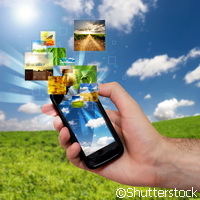Wireless communication: EARTH project scoops Future Internet Award!
With the carbon footprint of the mobile communications sector set to triple by 2020, making the way we communicate greener is a key priority of the European Commission's Digital Agenda strategy. And an EU-funded project that set out to do just that has just scooped the 2012 Future Internet Award for developing unprecedented energy efficiency solutions for wireless communication networks. The researchers from the EARTH ('Energy aware radio and network technologies') project successfully optimised the energy use of 4G LTE (Long-Term Evolution)-based stations, which account for the highest energy consumption in the mobile network. Mobile video and other data services such as mobile phones and tablets consume much more energy than 'traditional' mobile phones, and as the number of people accessing the Internet via these wireless devices continues to increase exponentially, it is imperative to make them more energy efficient. This was also European Commission Vice President Neelie Kroes' message: 'The ICT sector is growing, but its carbon footprint should not follow. I congratulate the partners of the EARTH project who have found ways to deliver the services we need while reducing CO2 emissions and cutting down on energy bills.' Since it kicked off in January 2010, EARTH, which received almost EUR 9.5 million of funding under the ICT ('Information and Communication Technology') Theme of the EU's Seventh Framework Programme (FP7), has brought together researchers from 15 partner institutions across 10 European countries: Belgium, Germany, Spain, France, Italy, Hungary, Portugal, Finland, Sweden and the United Kingdom. The project partners that make up the consortium hail from both industry and academia. The team contest that by optimising the network's energy use, electricity bills for operators will gradually fall, making it more affordable to use a mobile phone, with the added benefit of also reducing pollution and carbon emissions. By reducing the power required to operate each mobile base station, it is also expected that in the future these stations could be operated reliably by renewable energy, further reducing emissions. The EARTH project runs until June 2012 and the products developed as part of the project are expected to be available on the market in 2014. The project's industrial and small and medium-sized enterprises (SME) partners have already started to transfer the project results into real products for the multi-billion euro global 4G product market. The Future Internet Award announcement was made by the European Commission's Director of the Directorate-General for the Information Society and Media, Mario Campolargo, during the closing plenary of the first Future Internet Assembly of 2012, which was held in Aalborg, Denmark on 10 and 11 May. The ICT sector has been estimated to represent about 2% of global CO2 emissions. Digital Agenda actions have been incorporated into the Europe 2020 strategy's energy and climate change targets to cut greenhouse gases and primary energy consumption by 20%, and increase the amount of energy produced from renewables.For more information, please visit:EARTH:http://www.ict-earth.eu
Countries
Belgium, Germany, Spain, Finland, France, Hungary, Italy, Portugal, Sweden, United Kingdom



